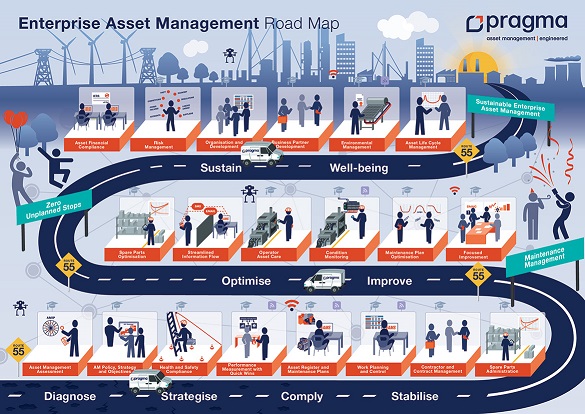
The planner qualification is aligned with the Maintenance Planner Qualification Curriculum (Occupational Code 312202) as registered by the Quality Council for Trades and Occupations (QCTO – Accreditation Number: QCTOSDP00180912-1330). It has been directed at NQF Level 5 and carries 261 credits.
You should complete the qualification in 18 months.
The various courses that make up this programme must be completed while you are completing the practical statement of work. The statement of work is a list of tasks and activities which you need to complete in the workplace within a six-month period as part of the qualification requirements. This statement of work will need to be signed off by your line manager.
Duration: 8 hours
Select this course If you are interested in the completing the Maintenance Planner Qualification. If your application is successful, you will be enrolled in all the necessary courses for the relevant financial year.
The planner qualification is aligned with the Maintenance Planner Qualification Curriculum (Occupational Code 312202) as registered by the Quality Council for Trades and Occupations (QCTO – Accreditation Number: QCTOSDP00180912-1330). It has been directed at NQF Level 5 and carries 261 credits.
You should complete the qualification in 18 months.

The planner qualification is aligned with the Maintenance Planner Qualification Curriculum (Occupational Code 312202) as registered by the Quality Council for Trades and Occupations (QCTO – Accreditation Number: QCTOSDP00180912-1330). It has been directed at NQF Level 5 and carries 261 credits.
You should complete the qualification in 18 months.
The various courses that make up this programme must be completed while you are completing the practical statement of work. The statement of work is a list of tasks and activities which you need to complete in the workplace within a six-month period as part of the qualification requirements. This statement of work will need to be signed off by your line manager.
Duration: 8 hours

Introduction to Asset Care provides an overview of best practices in the world of Maintenance. The ideal maintenance model for any organisation is introduced and unpacked to clearly show how the different areas within Maintenance can and should work together to achieve plant optimisation in a cost effective and measurable way.
Duration: 26 hours

Introduction to Asset Care provides an overview of best practices in the world of Maintenance. The ideal maintenance model for any organisation is introduced and unpacked to clearly show how the different areas within Maintenance can and should work together to achieve plant optimisation in a cost effective and measurable way.
Duration: 8 hours

That means, by implementing some form of a planning and scheduling method, you can improve resource utilisation from 25% to 50% which is a 100% increase!
After completing this course, you will be able to start implementing best practices across the maintenance work management cycle to ensure that your organisation can also double the wrench time and increase resource utilisation by 100%.
Duration: 24 hours

Maintenance Work Management process is vital in ensuring the long-term success of a maintenance programme. Operational efficiency is achieved when work is properly planned and scheduled based on best practice principles.
This course will teach best practices to ensure effective planning and scheduling techniques which will ensure that plants run efficiently and resources are allocated optimally.
Duration: 24 hours

Discover the art of planning a shutdown using sound project management principles tailored to meet the specific requirements of a shutdown.
In this course, you will learn the details of the processes and steps within each shutdown phase. You will be introduced to essential planning and scheduling techniques used to monitor the execution of a plan, and adjust the plan with minimal disruption to cost, risk and timeline. You will learn about the various role players and stakeholders needed to successfully manage and execute a shutdown, and gain an understanding of the documentation, regulations and compliance requirements associated with these projects.
The blended, flipped classroom learning approach of this course enables you to work through chunks of theory at your own pace, before you attend a live engagement session with an expert. These live sessions will focus on filling any gaps in your understanding of the theory and theory application. The live engagement sessions provide the opportunity for questions and answers specific to your role or industry and facilitate peer learning.
Enjoy!
Duration: 24 hours
This practical course first takes a look at the basics of project management. Learners then work through shutdown basics and explore the shutdown model online. During the contact session days, learners are given the opportunity to practise how to manage their project in their chosen project management software.
Please note: We remind and encourage learners that to achieve a successful learning experience they should:
- allow themselves sufficient time to complete all tasks
- have a laptop
- have a stable internet connection
- complete all of the online learning material as well as the activities in the contact sessions.
Duration: 24 hours

This course provides learners with content which can build the very important non-technical skills necessary to succeed in the modern-day workplace. Often employees are very skilled in terms of their technical know-how, but the modern-day workplace requires people who are able to work collaboratively and respectfully and drive cultures and behaviours which will ensure that the organisation succeeds.
Duration: 20 hours

This course is aimed at training front line operational teams to solve day-to-day problems by applying simple root cause analysis. It also gives these learners the context of where their problem-solving efforts fit into the larger, company-wide focused improvement efforts, as well as the process of selecting and implementing the solutions, and confirming that they have been successful.
Duration: 14 hours